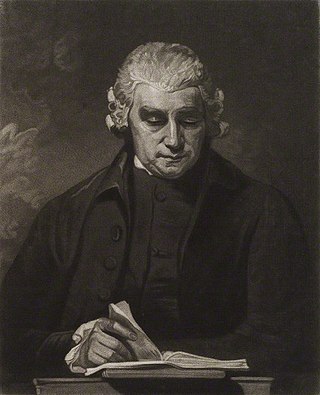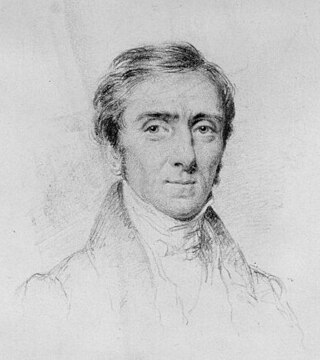Related Research Articles

Samuel Daniel (1562–1619) was an English poet, playwright and historian in the late-Elizabethan and early-Jacobean eras. He was an innovator in a wide range of literary genres. His best-known works are the sonnet cycle Delia, the epic poem The Civil Wars Between the Houses of Lancaster and York, the dialogue in verse Musophilus, and the essay on English poetry A Defense of Rhyme. He was considered one of the preeminent authors of his time and his works had a significant influence on contemporary writers, including William Shakespeare. Daniel's writings continued to influence authors for centuries after his death, especially the Romantic poets Samuel Taylor Coleridge and William Wordsworth. C. S. Lewis called Daniel "the most interesting man of letters" whom the sixteenth century produced in England.

John Payne Collier was an English Shakespearean critic and forger.
This article contains information about the literary events and publications of 1782.

Isaac Reed was an English Shakespearean editor.

Constance Collier was an English stage and film actress and acting coach. She wrote hit plays and films with Ivor Novello and she was the first person to be treated with insulin in Europe.

All for Love; or, the World Well Lost, is a 1677 heroic drama by John Dryden which is now his best-known and most performed play. It is dedicated to Earl of Danby. It is a tragedy written in blank verse and is an attempt on Dryden's part to reinvigorate serious drama. It is an acknowledged imitation of Shakespeare’s Antony and Cleopatra, and focuses on the last hours of the lives of its hero and heroine.

Octavia the Younger was the elder sister of the first Roman Emperor, Augustus, the half-sister of Octavia the Elder, and the fourth wife of Mark Antony. She was also the great-grandmother of the Emperor Caligula and Empress Agrippina the Younger, maternal grandmother of the Emperor Claudius, and paternal great-grandmother and maternal great-great-grandmother of the Emperor Nero.

Caesar Augustus, also known as Octavian, was the first and among the most important of the Roman Emperors. As such, he has frequently been depicted in literature and art since ancient times.
Gilbert West (1703–1756) was a minor English poet, translator, and theologian in the early and middle eighteenth century. Samuel Johnson included him in his Lives of the Most Eminent English Poets.

Mary Collier was an English poet, perhaps best known for The Woman's Labour, a poem described by one commentator as a "plebeian female georgic that is also a protofeminist polemic."
John Cooper (1793–1870), was a British actor active between 1811 and 1859, who played in "a singularly large number of parts, some of them of leading importance" in many locations in England, Wales and Scotland.

Cleopatra VII, the last ruler of Ptolemaic Egypt, died on either 10 or 12 August, 30 BC, in Alexandria, when she was 39 years old. According to popular belief, Cleopatra killed herself by allowing an asp to bite her, but for the Roman-era writers Strabo, Plutarch, and Cassius Dio, Cleopatra poisoned herself using either a toxic ointment or by introducing the poison with a sharp implement such as a hairpin. Modern scholars debate the validity of ancient reports involving snakebites as the cause of death and if she was murdered or not. Some academics hypothesize that her Roman political rival Octavian forced her to kill herself in a manner of her choosing. The location of Cleopatra's tomb is unknown. It was recorded that Octavian allowed for her and her husband, the Roman politician and general Mark Antony, who stabbed himself with a sword, to be buried together properly.

Samuel Weller Singer (1783–1858) was an English author and scholar on the work of William Shakespeare. He is also now remembered as a pioneer historian of card games.
Antony and Cleopatra is a 1974 videotaped television production of William Shakespeare's 1606 play of the same name, produced by ATV starring Richard Johnson as Mark Antony, Janet Suzman as Cleopatra, and Patrick Stewart as Enobarbus. It was directed by Jon Scoffield and is an adaptation of Trevor Nunn's Royal Shakespeare Company (RSC) production of the play. It features then-little-known Ben Kingsley and Tim Pigott-Smith in small roles.
Stephen Jones (1763–1827) was an English literary editor, best known for his revision of the Biographia Dramatica.
Octavius Graham Gilchrist was an English man of letters and antiquary.

Edward Vernon Utterson was a British lawyer, literary antiquary, collector and editor. He was a fellow of the Society of Antiquaries, one of the original members of the Roxburghe Club, a member of the Athenaeum Club, Camden Society and Royal Society of Arts, Recorder of Chichester and a Trustee of the Royal Victoria Yacht Club. He went on to become one of the Six Clerks in Chancery, a position which he kept until his retirement on the abolition of the post in 1842, and also founded the Beldornie Press.
Robert Gough, also Goughe or Goffe, was an English actor who took female parts in Shakespeare's plays. He was the father of actor Alexander Gough.

Henry Howe was an English actor, appearing in prominent roles at London theatres. He was a member of the company at the Haymarket Theatre for forty years.
John Bland was an Irish barrister and writer. He is known for a single dramatic work, the Song of Solomon (1760).
References
- 1 2 3 4 5 6 Knight, John Joseph (1885–1900). . Dictionary of National Biography . London: Smith, Elder & Co.
- 1 2 Introduction to the Malone Society reprint of The Virtuous Octavia, Oxford, 1909.
- 1 2 3 Baker, David Erskine; et al. (1812). Biographia Dramatica Or a Companion to the Playhouse. London: Longmann, Hurst. pp. 384–5.
- ↑ Collier, John Payne (1831). History of English Dramatic Poetry to the Time of Shakspeare and Annals of the Stage to the Restoration, Volume 3. Vol. 3. London: F. J. Murray, 1831. pp. 257–8.